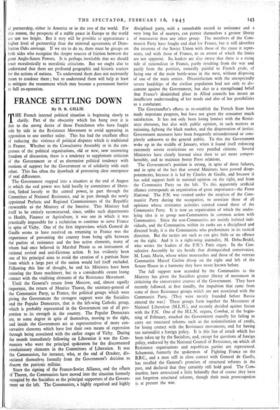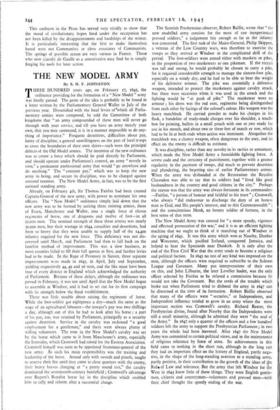FRANCE SETTLING DOWN
By D. R. GILLIE The Government stepped into a situation at the end of August in which the real power was held locally by committees of libera- tion, linked loosely to the central power, in part through the Committee of National Resistance, and in part through the newly appointed Prefects and Regional Commissioners of the Republic answerable to the Ministry of the Interior. This Ministry had itself to be entirely reconstructed, since, unlike such departments as Health, Finance or Agriculture, it was one in which it was practically impossible for a technician to continue to serve France in spite of Vichy. One of the first impressions which General de Gaulle seems to have received on returning to France was the importance of preventing the country from being split between the purists of. resistance and the less active elements, many of whom had once believed in Marshal Petain as an instrument of national revival and anti-German action. It has evidently been one of his principal aims to avoid the creation of a partisan State from which a large part of the nation would feel itself excluded. Following this line of thought, he and his Ministers have been restoring the State machinery, but to a considerable extent losing contact with the vitalising elements of the Resistance Movement.
Until the General's return from Moscow, and, almost equally important, the return of Maurice Thorez, the secretary-general of the Communist Party, to France, the political groups which were giving the Government the strongest support were the Socialists and the Popular Democrats, that is the left-wing Catholic group, which is probably represented in the Government out of all pro- portion to its strength in the country. The Popular Democrats are, to some degree in spite of themselves, moving to the right, and inside the Government act as representatives of more con- servative elements which have lost their own means of expression through being associated with the earlier stages of Vichy. During the month immediately following on Liberation it was the Com- munists who were the principal spokesmen for the discontented revolutionary elements in the Committees of Liberation. It was the Communists, for instance, who, at the end of October, dis- sociated themselves formally from the Government's decision to disarm the patriotic militias. Since the signing of the Franco-Soviet Alliance, and the return of Thorez, the Communists have moved into the situation formerly occupied by the Socialists as the principal supporters of the Govern- ment on the left The Communists, a highly organised and highly disciplined party, with a remarkable record in resistance and a very long list of martyrs, can permit themselves a greater liberty of manoeuvre than any other group. The members of the Com- munist Party have fought and died for France, but it still identifies the interests of the Soviet Union with those of the cause it repre- sents, and with those of France, to an extent of which the limits are not apparent. Its leaders are also aware that there is a rising tide of nationalism in France, partly resulting from the war and partly from the position, naturally painful to French pride, of being one of the main battle-areas in the west, without disposing of one of the main armies. Dissatisfaction with the unexpectedly severe hardships of the civilian population lead not only to dis- content against the Government, but also to a strengthened belief that France's diminished place in Allied councils has meant an insufficient understanding of her needs and also of her possibilities as a combatant.
The GovernmEnt's efforts to re-establish the French State have made important progress, but have not given the consumer much satisfaction. It has not only been losing 'contact with the Resist- ance elements, but also with public opinion, in such matters as rationing, fighting the black market, and the dispensation of justice. Government measures have been frequently misunderstood or com- pletely unknown to the general public. To this the Government woke up in the middle of January, when it found itself enforcing extremely severe restrictions on very puzzled citizens. Several Ministries have clearly learned since then to act more compre- hensibly, and to maintain better Press relations.
The Government's position is strong, in spite of these failures, and in spite of the fact that several Ministers have proved disap• pointments, because it is led by Charles de Gaulle, and because it has solid support both in national opinion on the right, and from the Communist Party on the left. To this apparently artificial alliance corresponds an organisation of great importance—the Front National. The F.N. was created under the auspices of the Com- munist Party during the occupation, to associate those of all opinions whose resistance activities centred round those of the Communist Party. It is now an organisation of which the under- lying idea is to group non-Communists in common action with Communists. Since the non-Communists are mainly isolated indi- viduals, and the Communists within its ranks are a disciplined and directed body, it is the Communists who predominate in its tactical direction. But the tactics are such as can give little or no offence on the right. And it is a right-wing journalist, M. Debu-Bridel, who writes the leaders of the F.N.'s Paris organ. In the Con- sultative Assembly he sits beside that distinguished conservative, M. Louis Marin, whose white moustaches and those of the veteran Communist Marcel Cachin droop on the right and left of the Senate House in a harmony they have never known before.
The full support now accorded by the Communists to the Ministry has given the Socialists greater liberty of movement in criticising the conservative courses of the Government. They have recently followed, at first timidly, the impulsion that came from some of those Resistance groups which are not associated with the Communist Party. (They were mostly founded before Russia entered the war.) These groups form together the Movement of National Liberation (M.L.N.), and recently decided against fusion with the F.N. One of the M.L.N. organs, Combat, at the begin- ning of February, attacked the Government roundly for failing to carry out structural reforms such as the nationalisation of credit, for losing contact with the Resistance movements, and for having too nationalist a foreign policy. It is this line of attack which has been taken up by the Socialists, and, except for questions of foreign policy, endorsed by the National Council of Resistance, on which all Resistance organisations and republican parties are represented. Schumann, formerly the spokesman of Fighting France on the B.B.C., and a man still in close contact with General de Gaulle, has recalled the General's promises of structural reforms in the -past, and declared that they certainly still hold good. The Com- munists have announced a little belatedly that of course they have not forgotten structural reforms, though their main preoccupation is at present the war.
This outburst in the Press has served very vividly to show that the mood of revolutionary hopes bred under the occupation has not been killed by the disappointments and hardships of the winter. It is particularly interesting that the first to make themselves heard were not Communists or close associates of Communists. The springs of possible action are very various in France. Those who now classify de Gaulle as a conservative may find he is simply forging his tools for later action.



























 Previous page
Previous page